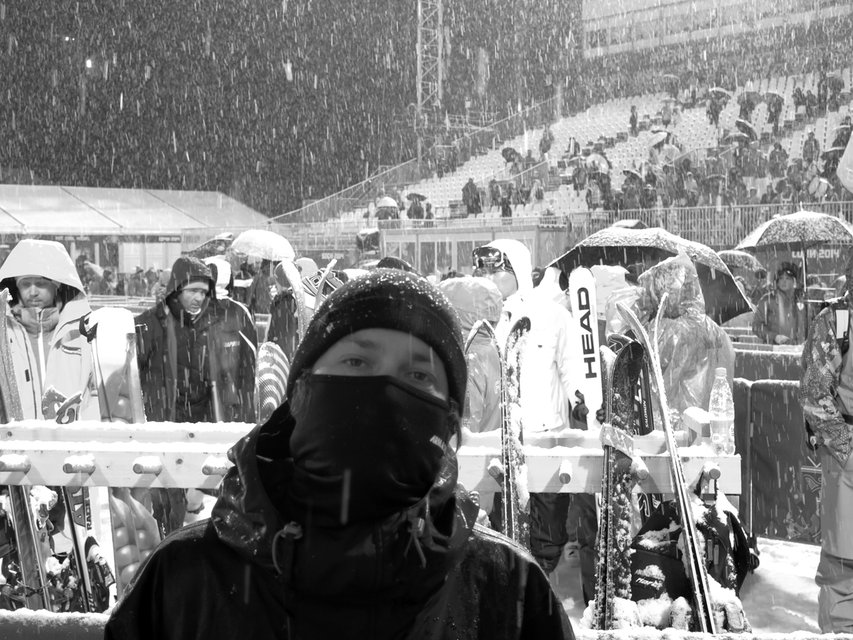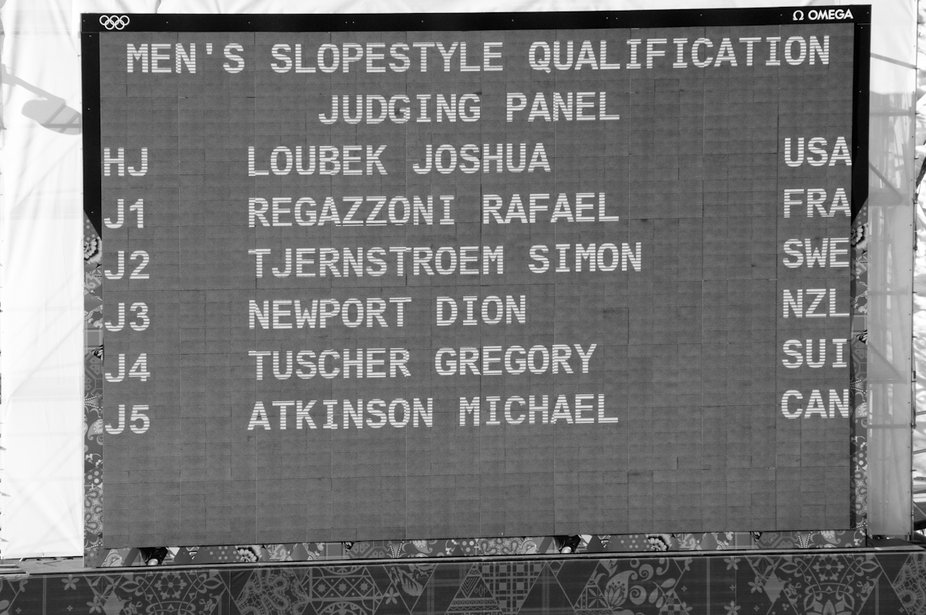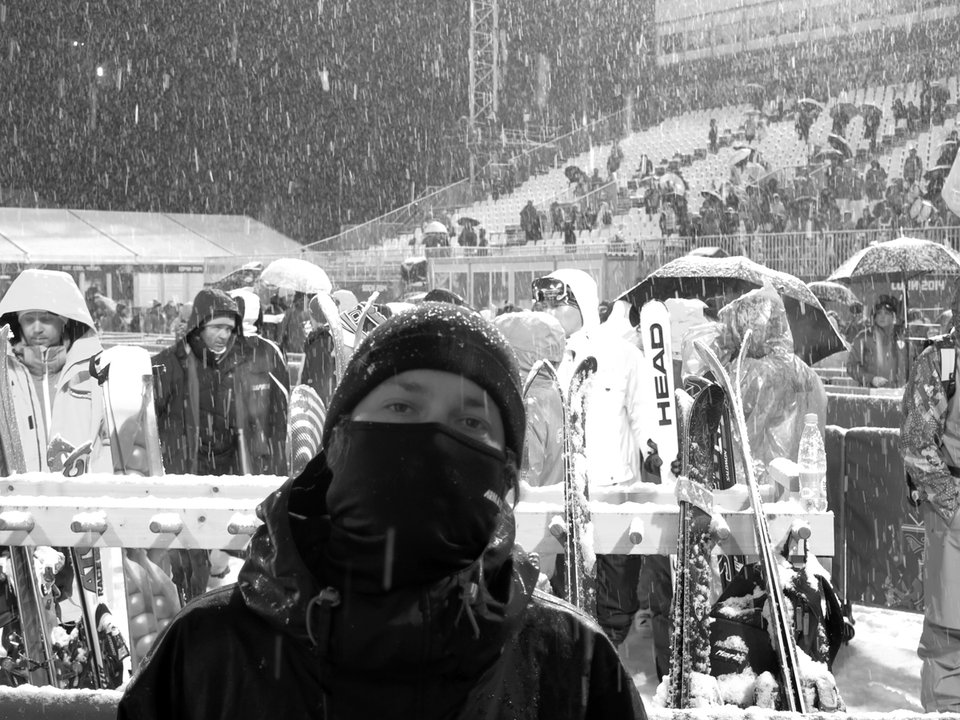
Raf being a G at the bottom of the Olympic halfpipe in Sochi. Photo: Mike Atkinson
Interview by Ethan Stone
"What's up, man? Nice to see you!" Raf Regazzoni steps out of the hotel elevator and strides across the lobby to greet me. We'll go up to his room to do the interview—but first let's grab some beers from the bar.
In baggy sweatpants, an Inspired Media T-shirt, and long, unruly hair poking out under his beanie, Raf sticks out a bit among the crowd of blue-shirted FIS officials filling up the hotel bar. We are, so to speak, at the heart of the beast: the official FIS hotel lodging all FIS officials at the Sochi Winter Olympic Games.
These graying, stodgy-looking sports officials sipping their light beers are the gatekeepers, the timers, the bean-counters that regulate nearly all competitive alpine skiing. And Raf, incongruous though he may appear, belongs right here with them. He's one of six officials here in Sochi to judge the skiing competition in halfpipe and slopestyle.
But Regazzoni is more than a judge alone—he's kind of like a mafia don of the newschool ski scene in Europe. Between ties to European media powerhouse The Distillery, organizing high-level events like the B & E Inventational and Vars Tournament, and representing both the AFP and Inspired Media Concepts in Europe, Raf has his fingers in many pies. Here in Sochi, I'm hoping to pick his brain about how our particular form of skiing got to this venue, what it's like to judge the Olympics, and where the sport should go from here.
On his skiing roots and his start in the ski industry
I grew up in the Alps in the Tarantaise Valley. My cousin was a moguls rider and he got me into freestyle. I got some photos in magazines in France, but I've never been really good. I saw my cousin and other friends getting injured and losing their sponsors and having nothing to do afterwards, so I thought I'd try to figure out a way to stay in the ski industry.
I needed to learn English, so I moved abroad when I was 21 years old. I moved to Sweden, where they all speak perfect English, and there are a lot of girls that want to help you speak English. So I went there for a year and got my degree in international sport management.
A small ski company in my hometown, Zag Skis, asked me to work for them. I took care of the sales stuff, some of the communications and the team riders. Then the company went bankrupt and some of the riders on the team, some of my friends who were still skiing in France, asked me to manage them, to help figure out contracts and get into events outside of Europe. That was when I got into the international side of skiing.
On getting into judging
The Austrian Open was the first event I judged at, and apparently I did a good job because Nick Draxl, who was Russ Henshaw's coach back in the day, asked me to come to New Zealand the next summer to judge the NZ Open. There was no money and I was barely able to pay for my flight, but I thought that maybe the experience would lead me somewhere.
I met [AFP head judge] Josh Loubek over there. Josh loved me the first time we met. He said, "Finally we've got a Euro guy who wants to be involved and looks good on the judging."
They had a bunch of big events in Europe like freestyle.ch, King of Style, London Freeze, that wanted to have AFP judges but didn't have the money to pay the U.S. guys to come over. They wanted to find Euro guys who could do it.
I started helping the AFP grow in Europe, starting to implement the judging and finding people who wanted to be involved in each country. We struggled a lot at the beginning. It was hard to find someone that wanted to be involved and also had the time to do it.
On the AFP and FIS
FIS got in touch with us [the AFP] independently, asking if we wanted to be the face of the judging for the Olympics, if we wanted to work on creating a full format with them, implementing a World Cup, judging clinics and so on.
At first I thought like everyone thought—it's going to be bad for the sport to go to the Olympics. But it was going there anyway, with or without us. If we say no then they're going to bring moguls guys in. That was the case already before. So we thought, let's work together and try to make our judging as good as we can.
We [the AFP judges] started with the FIS World Champs in Park City in 2011. At the World Champs we had our own panel, which was pretty much the same as the guys here in Sochi. Then Simon and I did the final of the World Cup in La Plagne.

At La Plagne there were four moguls judges that we'd never met before, and two of us [AFP judges]. The head judge was the same guy that's the head judge for moguls here in Sochi. After the first night we figured out that these guys were just following our scores. The head judge had no idea that you could adapt for the scores for the cut based on discussion.
After the first night I was yelling at these guys, telling them either to follow up with what we're telling them and learn from it, or we would leave. It was nuts to see that happening, the final of the World Cup and bad calls with judging. We didn't want to be involved with those guys if they can't make the calls. How can we answer questions from the riders when we don't know if the other judges know anything?
We decided to send a strong email together from the AFP to FIS saying, "Okay, you guys want us to go the Olympics, you want to have a strong judging panel. So let us decide who should be the judges."
On judging slopestyle
There's a lot of discussion beforehand. It's all about watching the training, figuring out what's going on, and figuring out a range. Like, this group of five guys is more like a high average, and these guys are above that, and these guys are on top.
Here in Sochi we've been discussing a lot about the rails because there are so many options. It's not like halfpipe where there's only one option. So we have to discuss line choice, the combos, and all this stuff.
When it comes to style it's really hard to discuss. We had to figure out how to talk about style. You're never going to talk to a rider and say they didn't have style. It's no respect to the guy in front of you. So we came up with execution, which is related to style, but also the way the trick looks like in general.

The head judge's work is to see the overall run and start figuring out where it would be placed: low eighties, mid eighties, high eighties, whatever. The judges start comparing runs, and that's where you start arguing.
Something that is really important to understand about judging in our sport is that we don't score what the guy is doing, we score to place him.
We don't always agree, and that's why we have five scoring judges. When it's a tight discussion, we vote. It's majority judging. Sometimes we have three against two, sometimes it's four against one. If the majority says the score should be higher or lower, then we adapt the scoring.
There's a lot of arguing. There are people in the booth like myself and Simon who have a strong voice. We like to make our point. You need to have that leader who's making points, like—look, on three jumps, this guy did three different grabs and three different axes of rotation.
On judges discussing in the booth
We are too young as a judged sport. It's a young sport that's still progressing, and there's new stuff coming up every time. We saw that here. A lot of things popped out, like Joss [Christensen] winning with a crazy run. A switch right triple! We needed to discuss with everybody in there [the judging booth] to make the right call for the sport in general.
Some people say that by discussing you can influence the scoring if someone is really influential in the booth. But I think we need that right now. I saw the snowboard guys at the FIS events not talking to each other, and they had 20 points difference in their scores.
Sometimes the snowboard guys had a range between like a 78 and a 91. That's the difference between tenth place and the podium. There should never be such a big a difference in the scores because it means that nobody agrees. How you can explain the judging to the riders when you can't agree in the booth?
Don't get me wrong, we have differences in scoring as well. But we try to keep it to ten points. When you don't talk to each other, you're not sure that the guy next to you knows what he's talking about. Maybe he didn't see the right grab, maybe he didn't see the mistake that someone else saw. That's why we're still discussing, so we don't make those mistakes.

On taking heat as a judge
It's hard to find people who want to come and get paid shit, and take shit from a lot of people—from media, from riders, from coaches.
It's so easy to be in front of your screen and complain, so easy to give shit to the judges when you are sitting on your couch and having a beer with your friends.
In the slopestyle event we only had two little issues. We had Luca Tribondeau, the Austrian kid who didn't make the cut for finals. On paper, everything he did was insane. The execution was the main thing with him in the end.
And then we had Henrik. He was pissed off afterwards because a lot of media from Sweden were pushing him that way. They thought they got screwed in snowboard slopestyle five days before [Sven Thorgren got fourth], and the Swedish media felt that the judging wasn't on point.
Everyone else understood that he [Henrik] had a hand drag. He would have been on the podium without that. But he had those mistakes compared with people who didn't make any mistakes. He didn't have the cleanest run that he could have.
On the example that the Olympics set
It [slopestyle] is great on TV. It's great for mainstream media. People are going to want to do it. It's going to give the lead for the next four years for whatever we're going to do in terms of the normal format of competitions.
Parents are going to say, fuck yeah, my kid's going to go to the Olympics, so I'm going to put him in the park instead of the racing club. It's going to be great, that's for sure But there are other things to do besides "classic" slopestyle and halfpipe.
It's about the example that you show to the kids. Instead of having fun on the slopes and learning how to ski and shred some powder and learn the basics, just go to the trampoline. Go to Woodward, learn how to do it on foam, learn how to do it on trampoline, and you're going to win the X Games, you're going to be on the podium at the Olympics.
What can we do? We're not going give Jossi [Wells] the win with three zeros in a row, but we all loved that. That Finnish kid that did the switch double backflip japan, so sick! You should have seen us yelling in the booth when we saw that. But we're not going to give the win to someone like that. How much shit would we get for something like that? It's not our role to change the world. It's the riders' voices that we have to follow.
On Henrik Harlaut
You don't have to be the craziest, most technical guy around to be the most famous skier in the world. Henrik proved that he is the one that people want and like to see. There were so many comments from the industry and from spectators about his run. The guys on the podium deserved their medals, but from my side I haven't heard anyone asking questions outside of "why didn't Henrik win, his run was crazy?".
He's got Wu Tang shit right now. That's never happened to any sports guy before, which is insane when you think about it. And how does he get it? By being himself from the beginning. He's always been that kid with Wu Tang moves. He has his style and he wants to show people what style is.
On using Olympics exposure to build something different
I can tell you I'm quitting judging at the end of the season. It's been in my head for a long time. I feel we have to create something right now and not let our sport go this direction with competitions.
The good side is using the Olympics exposure to help build something new. It's time for us to offer something different. Not just to the riders that are here nowadays, but to the kids. Show them what we are capable of. Let's get inspired from surfing and skateboarding and mix up different events and different formats.

The B & E Inventational and all these events, there's something behind it. We want to create a tour called the "Inspired Snow Series," it's slated to start next season with a "beta version" including two events, one in North America to be announced and the B&E Inventational. The idea is to have a third BC event coming in 2016 as well as a potential fourth event.
We want to do different formats, backcountry, urban, whatever, and do it like the [skateboarding] Street League is doing, with a different system and TV format, also based around music. Bring the legends, bring the comp guys and the film guys. Do an opening before to support the roots, the kids that want to come, and do live streaming because that's the only way to get people in. Do a format that people can understand, and change the rules by bringing the fun back to high-quality events. We can have fun and still have an event that's appealing to the general public and TV audiences.


Comments